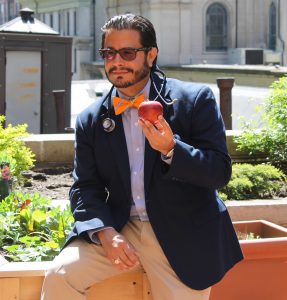The Power of Food as Medicine
 The food as medicine movement is quickly picking up steam as physicians and healthcare institutions begin to recognize the many tangible benefits of making food an integral part of treatment. Research on the power of food to prevent and fight disease is creating a paradigm shift in the way that treatment is provided. Instead of simply prescribing a “pill for an ill,” an ever-growing number of physicians choose to integrate dietary changes in their healthcare recommendations.
The food as medicine movement is quickly picking up steam as physicians and healthcare institutions begin to recognize the many tangible benefits of making food an integral part of treatment. Research on the power of food to prevent and fight disease is creating a paradigm shift in the way that treatment is provided. Instead of simply prescribing a “pill for an ill,” an ever-growing number of physicians choose to integrate dietary changes in their healthcare recommendations.
A leading proponent of this approach to care is Dr. Robert Graham, a Harvard-trained physician who is board-certified in both Internal and Integrative Medicine. In his view, while there is no one ideal diet for all, cutting down on or eliminating processed foods can be highly beneficial regardless of a person’s age or health status. The term “processed food” can be used to describe any item of food that has been altered from its original state. Though not all processed foods are unhealthy, per se, many contain artificially elevated amounts of salt, sugar, and fat – substances that are widely believed to be responsible for America’s high rates of obesity, diabetes, and heart disease. Eating right, along with regular exercise and getting sufficient sleep, can fundamentally improve an individual’s health and their quality of life. The key, Dr. Graham believes, is instilling in doctors the notion that patients should actively pursue good health through conscious dietary choices in close consultation with their healthcare providers. Medical education should emphasize the critical role that food selection plays in the health of all individuals. Another important development should take place at the policy development level. Instead of the government giving heavy subsidies to industrial farming and food production operations that are responsible for producing the heavily processed foods so many in America eat, more resources should be allocated to smaller, local farms that produce healthier food and do less damage to the environment.
Addressing the root cause(s) of a disease and not just the disease itself is the defining feature of Integrative Medicine. IM – as it is often referred to – combines the best of conventional Western medicine with alternative or complementary treatments that are supported by clinical evidence. The food as medicine school of thought has been eagerly adopted by IM practitioners such as Dr. Graham who champion whole-person wellness through a combination of treatment, health promotion, and illness prevention.
The American Board of Integrative Medicine® (ABOIM) is a member board of the American Board of Physician Specialists (ABPS) – the only multispecialty certifying body to offer IM board certification in the United States. Becoming an ABOIM Diplomate offers an IM practitioner the opportunity to demonstrate his or her mastery of the specialty’s core competencies. To request additional information about the ABOIM, contact the ABPS today. The ABPS is the official certifying body of the American Association of Physician Specialists®, Inc.






